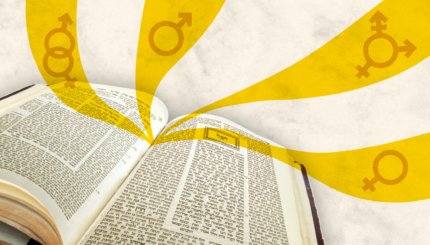May Peleg-Friedman, the Jerusalem Open House’s first trans chairperson and former owner of Jerusalem’s only queer nightclub “Mikveh” took her own life on Friday night at the age of 31.
By any standard, May was an extraordinary human; she overcame years of filial abuse and exploitation at the hands of strangers while living on the streets of Jerusalem. Her response to this suffering was to become a leader in her community, dedicating herself to bettering the lives of queer folk in Jerusalem’s mostly hostile environment. She coupled her political activity with the creation of Mikveh’s social space which she knew needed to be a safe, accepting home for many who might otherwise suffer as she had.
What made May’s life even more remarkable was the way in which she endeavored to be true to all the parts of herself. A dutiful member of her ultra-Orthodox family, she married and parented three children. After coming out and beginning the process of transition into a body more suited to her spirit, May struggled to remain a part of her family, most especially for her children. Though this battle was eventually lost and she was denied access to them, she remained devoted to her children and worked tirelessly to help them see the essence of who she was and her love for them.
May’s death coincided with the terror attacks in Paris. To my mind there is a deep and disturbing commonality that binds these two tragedies, namely, their religious nature. Monotheistic faiths in any of their more extreme forms function on a strict and dangerous binary system that divides ideas and people into categories of “sacred” and “profane.” The demonization and dehumanization of those deemed to be outside the realm of the sacred gives effective permission for mistreatment and even killing, all in the name of protecting holiness. In Paris, this violence focused on the other, while in May’s case it was turned inward.
Gender, like so much else connected with queerness, is a threat to any binary system that forces us to live in pre-ordained, tightly constructed and highly defended roles. As the most vulnerable member of both the queer and Jewish communities, May received the full brunt of wrath that comes with being a challenge to the social order in which she lived. Her valiant effort to change this reality for others was tragically unable to shield her from the personal loss of all that was dear to her.
In a final act of brutality that stems from the religious tyranny of the binary, May’s estranged family (backed by local religious-civic authorities) attempted to block her expressed desire to be cremated, assuring that the body and gender she so deeply cared for, would leave this world in its intended female form. They petitioned the courts to force a standard “Jewish” burial using May’s male identity.
READ: Court Upholds Transgender Woman’s Cremation After Haredi Family Challenges It
The religiously-based cruelty that was an everyday reality for May, like the cruelty of those who turned guns and bombs on the citizens of Paris overwhelms me. It leaves me feeling bereft of hope and a sense of belonging — to my faith and to the human race into which I was born. It is only the courage exhibited by people like May, their stubborn refusal to give into the worst of human nature and instead demand its very best, that offers me hope and solace. It is this legacy that we must all aspire to embody, so that we might leave the world a slightly better, slightly less binary place than we found it, if not for our own sake than for that of our children.
If there is a God, Zhe is surely weeping for what has become of Zher creation.
If there is a heaven, it has surely embraced May, allowing her finally to be free of pain, able to be at peace with who she was created to be.
If there is humanity, we must learn from and act upon the lessons of the short, powerful and ultimately tragic life of May Peleg-Friedman.
We owe that her, to her children and to all those whose uniqueness adds to the possibility of beauty and diversity among our species.
Like this post?

